The landscape of work has undergone a seismic shift over the past decade, driven by technological advancements, changing work preferences, and the rise of the gig economy. As traditional office setups evolve, coworking spaces have emerged as a crucial component of the modern work environment. These shared workspaces are not just about providing a desk and Wi-Fi; they represent a broader transformation in how we work, collaborate, and innovate. Let’s explore some of the key trends and innovations shaping the future of coworking spaces.
- Flexibility and Adaptability
One of the most significant advantages of coworking spaces is their flexibility. Unlike conventional office leases, coworking spaces offer various membership plans, ranging from hot desks to private offices. This flexibility is especially beneficial for freelancers, startups, and remote workers who may need to scale their workspace requirements up or down based on their business needs. Additionally, many coworking spaces are now providing 24/7 access, allowing members to work at their own pace and on their own schedule.
- Community and Networking
Coworking spaces are designed to foster a sense of community. By bringing together professionals from diverse industries and backgrounds, these spaces create opportunities for networking, collaboration, and knowledge sharing. Many coworking hubs organize regular events, workshops, and social activities, helping members build connections and enhance their professional growth. This sense of community can be particularly valuable for entrepreneurs and small business owners who might otherwise feel isolated.
- Technology Integration
As technology continues to advance, coworking spaces are integrating the latest tools and innovations to enhance productivity and convenience. High-speed internet, cloud-based services, and advanced security systems are now standard features. Some coworking spaces are also experimenting with smart office technologies, such as IoT devices, AI-driven analytics, and virtual reality meeting rooms, to create more efficient and engaging work environments.
- Wellness and Sustainability
A growing focus on wellness and sustainability is influencing the design and operation of coworking spaces. Many spaces are incorporating elements such as natural lighting, ergonomic furniture, and green plants to create a healthier work environment. Additionally, initiatives like recycling programs, energy-efficient appliances, and sustainable building materials are becoming more common, reflecting a broader commitment to environmental responsibility.
- Specialized Coworking Spaces
As the coworking market matures, we are seeing the emergence of specialized coworking spaces tailored to specific industries or professions. For example, there are coworking spaces designed specifically for creatives, healthcare professionals, or tech startups. These specialized environments offer industry-specific resources, equipment, and networking opportunities, making them particularly attractive to niche markets.
- Hybrid Work Models
The rise of remote work and hybrid work models is driving demand for coworking spaces as companies look for flexible solutions to accommodate their distributed teams. Many organizations are adopting a hybrid approach, allowing employees to split their time between home, coworking spaces, and the corporate office. This trend is likely to continue, as it offers employees the flexibility they desire while still providing opportunities for in-person collaboration.
- Global Networks
As coworking becomes a global phenomenon, many operators are expanding their networks to multiple cities and countries. Membership in one location often grants access to a network of spaces around the world, providing a seamless experience for digital nomads and business travelers. This global reach not only supports mobility but also enhances the value proposition of coworking memberships.
Conclusion
The future of work is being shaped by the dynamic and innovative environment of coworking spaces. With their emphasis on flexibility, community, technology, wellness, and sustainability, coworking spaces are well-positioned to meet the evolving needs of the modern workforce. As these trends continue to develop, we can expect coworking spaces to play an increasingly vital role in how we work, collaborate, and thrive in the years to come.
Discover “The Future of Work: Trends and Innovations in Coworking Spaces” with Mushroom Spaces! Dive into the latest insights on how coworking environments are transforming work habits and business growth. From flexibility and technology integration to wellness-focused designs and global networking, explore the trends shaping the future of work. Join us in understanding how these innovations are fostering collaboration, productivity, and sustainability in modern workplaces.

